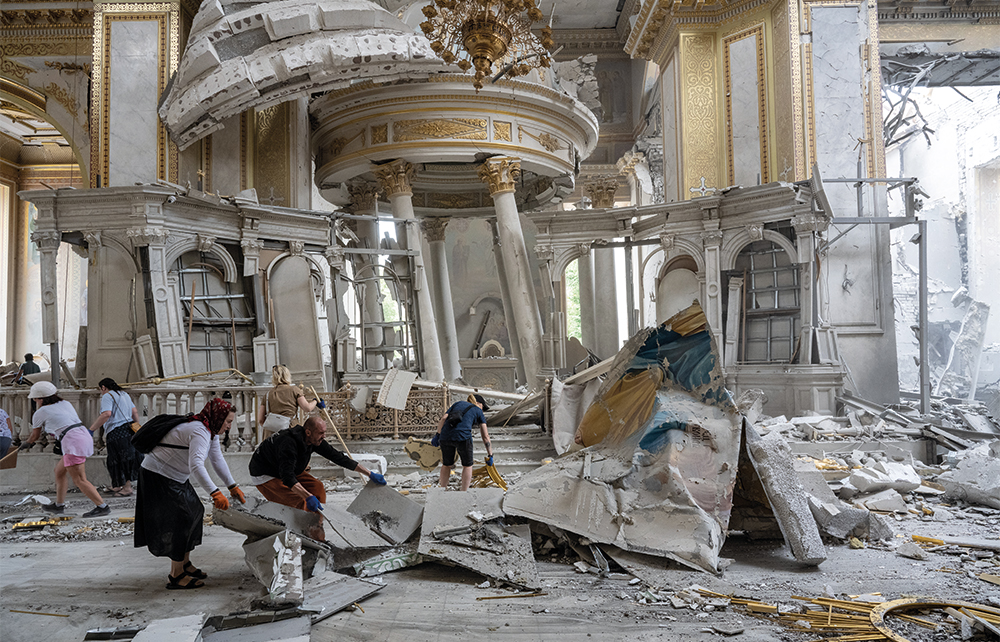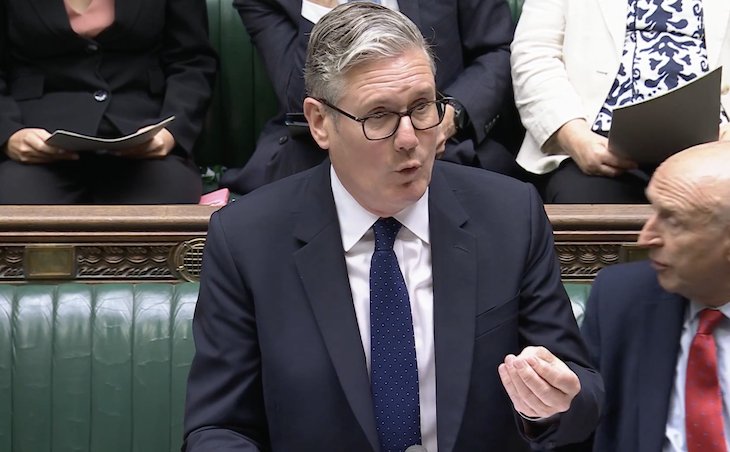How can you break the mental manacles of an empire that has occupied not only your physical world but also your education, publishing, media, high culture and popular entertainment? In his endearing memoir of Odesa, Undefeatable, Julian Evans quotes the Ukrainian author Viktoria Amelina, who describes growing up in post-Soviet Ukraine surrounded by all things Russian. She attended a Russian school, acted in children’s Russian theatre, listened to Russian rock and prayed in a Russian Orthodox church: ‘There was an entire system in place that aimed to make me believe that Moscow, not Kyiv, was the centre of my universe.’
When she was 15, Amelina felt flattered to be invited to Moscow for a Russian language contest. She was thrilled to be interviewed on state television. She felt like a star. But when the interviewer began to interrogate her about whether she felt downtrodden as a Russian speaker in Ukraine, Amelina realised:
I was just being used to manipulate millions of viewers of the evening news… I was only 15 years old. But in that split second, I had to figure out where the borders of my home were. I wasn’t Russian, after all – I was a Ukrainian kid brought to Moscow to reinforce certain Russian narratives.
Two decades later Russia would use these narratives to invade Ukraine. Amelina was killed last year – by a Russian missile that hit the pizzeria where she was eating. The building was probably targeted because it was often frequented by foreign journalists and NGO workers.
Evans’s book skilfully splices together the personal and the political, and some of his most fascinating characters are still wrestling with the borders of their identities. He describes Odesans who
identified with Russia and Russia’s greatness throughout their lives. They had watched Russia bomb [Russian-speaking] Ukrainian cities to the ground, make Ukrainian civilians its target, deport populations, kidnap children, murder government servants, artists, writers and journalists, rape women, castrate, starve and execute Ukrainian prisoners, yet they still found it hard to say it was Russia’s doing.
The struggle is particularly pronounced in Odesa. The tsars considered the city a jewel in the Russian empire – ‘the heart of the imperial riviera, a mercurial elixir for northern Russians’. Many famous Russian empire and Soviet writers came from Odesa or eulogised it. The Kremlin still considers it part of the ‘Russian world’. In the past decade it has been the mise en scène of dozens of Russian entertainment TV series – a way of incorporating the city into Russia in people’s imaginations before you attempt to capture it physically.
The world needs Odesa as much as Odesa needs the world. And Russia is trying to bomb the city to smithereens
But, as Evans explains, this Russian and Soviet history only tells part of the story. Before it was developed by Catherine the Great, Odesa was a Tatar settlement, ceded to the Grand Duchy of Lithuania. Moldovans and Greeks established themselves there before Catherine conquered it. The city’s first two governors were French. The engineer who planned the city was Flemish. But such fact-based arguments don’t always resonate with the older generation of Odesans, who feel their version of the city is under threat when the Ukrainian government attempts, as it did recently, to remove Russian street names and statues of Russian writers.
But it is not in disputes about historical beginnings where the battle for the city’s belonging will lie, but in who gets to define its future. Olena Matvieva, an Odesan civil society activist who ran a recent project on ‘Decolonising Odesa’, notes that even those who kindle nostalgic feelings towards Russia see their future in a Eurocentric Ukraine. The values most Odesans celebrate – entrepreneurialism; individual rights; cosmopolitanism – have more chance of flourishing in a democratic Ukraine than in a dictatorial Russia. A modern Ukraine is the means through which Odesa can achieve its age-old aspirations.
Even in the darkest Soviet days Odesa saw itself as a global port, interconnected with Marseille and Rotterdam. Today it is the Ukrainian capital of the grain corridor that supplies the whole world with food. The world needs Odesa as much as Odesa needs the world; and it is this future that Russia is trying to bomb to smithereens. The day I filed this review, a Russian missile hit residential and university buildings, killing ten and injuring 44 civilians.
As the murders intensify, the city is changing in other ways, too. Though Russian is still commonly spoken everywhere you go, the younger generation are now using more Ukrainian. When my family organised a Ukrainian language poetry festival, Meridian Czernowitz, in Odesa, the theatre was packed with young Odesans who had come to hear the latest wartime poems. My father, Igor Pomerantsev, a Ukrainian-British, Russian-language poet, whose own father was from Odesa, wrote:
It’s like something out of a movie, yet it is no movie. A boy on a bicycle rides in between explosions. You can’t see or hear the explosions – but I see and hear them. The boy rides around me, and I call to him: ‘Careful – explosions ahead!’ No, of course I don’t say anything. The whole city is a shooting range. Every person a live target. The Russian soldier who kills the boy will receive an award. But he will never, ever be given a medal engraved with the words: ‘For the capture of Odesa.’
Peter joined The Spectator’s Edition podcast to discuss the challenges facing Odesa, alongside author of The Spectator’s Ukraine newsletter Svitlana Morenets:







Comments